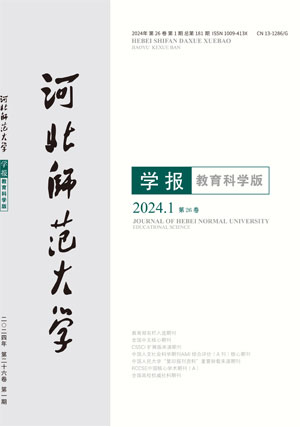期刊信息

- 刊名: 河北师范大学学报(教育科学版)Journal of Hebei Normal University (Educational Science Edition)
- 主办: 河北师范大学
- ISSN: 1009-413X
- CN: 13-1286/G
- 教育部名栏入选期刊
- 全国中文核心期刊
- CSSCI扩展版来源期刊
- AMI综合评价(A刊)核心期刊
- RCCSE中国核心学术期刊
- 全国高校特色栏目社科学报
- 中国人民大学“复印报刊资料”重要转载来源期刊
- 全国高校权威社科期刊
ChatGPT浪潮下的高阶能力培养:可为、难为、何为?
-
作者单位:(浙江大学 教育学院,浙江 杭州 310058) -
起止页码:80 - 88页 -
DOI:10.13763/j.cnki.jhebnu.ese.2024.04.011
Higher-order Ability Cultivation in the ChatGPT Era: Opportunities, Challenges, and Strategies
摘要/Abstract
在人工智能技术飞速发展的当下,ChatGPT的出现对人才高阶能力的培养产生了巨大影响。ChatGPT在高阶能力培养领域具有良好的应用前景,它可以为学生定制个性化教学,增强学习者的自主学习能力;锻炼学生的批判性思维,使其获得问题解决能力;采取多元方式,激发学习者的创新创造能力。但是,使用ChatGPT培养高阶能力也面临一定风险,学习者可能因为过度依赖数据而丧失主观能动性;或是困于信息茧房而导致思维模式窄化、固化;或者因为虚拟依赖而造成社会情感能力异化。面对以上问题,社会各界与教育主体需以人为本,巩固学生的主体地位;多方参与,规避数据伦理风险;提升认知,完善教育培养目标。ChatGPT是助力教育改革与发展的优质工具,规避其风险,发挥其优势是未来ChatGPT应用于高阶能力培养的有效路径。
The rapid development of artificial intelligence technology, exemplified by ChatGPT, significantly impacts the cultivation of higher-order abilities. ChatGPT shows great promise in advanced ability cultivation by offering personalized instruction, enhancing autonomous learning, fostering critical thinking, and improving problem-solving skills. Additionally, it can stimulate innovative and creative capabilities through diverse approaches. However, the integration of ChatGPT in higher-order ability cultivation also presents risks. Excessive dependence on data may undermine learners’ initiative, trap them in information cocoons, and narrow their thinking mode. Furthermore, virtual dependence may alienate social-emotional skills. Addressing these challenges requires a people-oriented approach that reinforces students’ active roles, multi-stakeholder involvement to mitigate data ethical risks, and enhanced cognitive and educational training goals. ChatGPT presents a valuable tool for driving educational reform and innovation. By navigating its opportunities and challenges strategically, educators can leverage this technology to enhance higher-order ability cultivation, equipping learners with the essential skills to thrive in an increasingly complex and technology-driven world.
关键词
参考文献 42
- [ 1 ] OpenAI. Introducing ChatGPT[EB/OL].(2023-06-30)[2024-03-30].https://openai.com/blog/chatgpt.
- [ 2 ] Farrokhnia M,et al.A SWOT Analysis of ChatGPT:Implications for Educational Practice and Research[J].Innovations in Education and Teaching International,2023(3):1-15.
- [ 3 ] ZHU C,et al. How to Harness the Potential of ChatGPT in Education?[J].Knowledge Management & E-Learning,2023(2): 133-152.
- [ 4 ] 邓莉.如何在教学上落实21世纪技能:探究性学习及其反思和启示[J].教育发展研究,2017(8):77-84.
- [ 5 ] [美]布鲁姆著.教育目标分类学[M].罗黎辉,等译.上海:华东师范大学出版社,1986.
- [ 6 ] 彭正梅,邓莉,周小勇.发展21世纪能力,建设现代教育强国——国际教育改革新趋势及中国应对[J].中国教育政策评论,2018(1):58-84.
- [ 7 ] 钟志贤.教学设计的宗旨:促进学习者高阶能力发展[J].电化教育研究,2004(11):13-19.
- [ 8 ] 贺樑,应振宇,王英英等.教育中的ChatGPT:教学能力诊断研究[J].华东师范大学学报(教育科学版),2023(7):162-176.
- [ 9 ] 陈静远,胡丽雅,吴飞.ChatGPT/生成式人工智能促进以知识点为核心的教学模式变革研究[J].华东师范大学学报(教育科学版),2023(7):177-186.
- [ 10 ] 姜华,王春秀,杨暑东.生成式AI在教育领域的应用潜能、风险挑战及应对策略[J].现代教育管理,2023(7):66-74.
- [ 11 ] 陆道坤,李淑婷.是“神马”还是“灰犀牛”:ChatGPT等大语言模型对教育的多维影响及应对之策[J].新疆师范大学学报(哲学社会科学版),2024(2):106-124.
- [ 12 ] 曹辉,赵梓含.ChatGPT的特质研判、教育审思与风险应对——基于“知识—主体—立场”的视角[J].现代教育管理,2023(7):75-84.
- [ 13 ] 张治.ChatGPT/生成式人工智能重塑教育的底层逻辑和可能路径[J].华东师范大学学报(教育科学版),2023(7):131-142.
- [ 14 ] 杨宗凯,王俊,吴砥等.ChatGPT/生成式人工智能对教育的影响探析及应对策略[J].华东师范大学学报(教育科学版),2023(7):26-35.
- [ 15 ] 祝智庭,彭红超.深度学习:智慧教育的核心支柱[J].中国教育学刊,2017(5):36-45.
- [ 16 ] 郑旭东,马云飞,范小雨.协作问题解决:人工智能时代必备的高阶能力[J].现代教育技术,2021(3):12-19.
- [ 17 ] 胡小勇,孙硕,杨文杰等.人工智能赋能:学习者高阶思维培养何处去[J].中国电化教育,2022(12):84-92.
- [ 18 ] 李海峰,王炜.面向高阶思维能力培养的数字孪生智慧教学模式[J].现代远距离教育,2022(4):51-61.
- [ 19 ] 中华人民共和国中央人民政府. 国务院关于印发新一代人工智能发展规划的通知[EB/OL].(2017-02-08)[2024-02-03].https://www.gov.cn/zhengce/content/2017-07/20/content_5211996.htm.
- [ 20 ] 关成华,黄荣怀.面向智能时代:教育、技术与社会发展[M].北京:教育科学出版社,2021.
- [ 21 ] 冯雨奂.ChatGPT在教育领域的应用价值、潜在伦理风险与治理路径[J].思想理论教育,2023(4):26-32.
- [ 22 ] 岳晓东.批判思维的形成与培养:西方现代教育的实践及其启示[J].教育研究,2000(8):65-69.
- [ 23 ] Mishra P,Kereluik K. What 21st Century Learning?[EB/OL].(2011-03-13)[2024-04-23].https://s3.amazonaws.com/aps-legacy-site/cms/lib2/VA01000586/Centricity/Domain/180/21stCenturyKnowledge_PM_KK.pdf.
- [ 24 ] Thoughtful Learning. What are Learning Skills?[EB/OL].(2024-04-23)[2024-04-23].https://k12.thoughtfullearning.com/FAQ/what-are-learning-skills.
- [ 25 ] 荀渊.ChatGPT/生成式人工智能与高等教育的价值和使命[J].华东师范大学学报(教育科学版),2023(7):56-63.
- [ 26 ] 姜玉莲,解月光.基于ESEM的高阶思维结构测量模型研究[J].现代远程教育研究,2017(3):94-104.
- [ 27 ] 吴永和,刘博文,马晓玲.构筑“人工智能+教育”的生态系统[J].远程教育杂志,2017(5):27-39.
- [ 28 ] 朝乐门.基于语义Web的人机协同知识处理研究[J].图书情报工作,2009(24):115-119.
- [ 29 ] [以]尤瓦尔·赫拉利著.未来简史[M].林俊宏,译.北京:中信出版社,2017.
- [ 30 ] Frey C,Osborne M. The Future of Employment: How Susceptible are Jobs to Computerisation?[J].Technological Forecasting and Social Change,2017(114): 254-280.
- [ 31 ] 叶波.人工智能+5G与教育变革[M].上海:华东师范大学出版社,2022.
- [ 32 ] Study.com. 89 Percent of College Students Admit to Using ChatGPT for Homework[EB/OL].(2023-01-27)[2023-07-04].https://futurism.com/the-byte/students-admit-chatgpt-homework.
- [ 33 ] 王妍.警惕网络“信息茧房”效应[J].人民论坛,2020(11):126-127.
- [ 34 ] 刘世清.智能教育的风险[M].北京:教育科学出版社,2022.
- [ 35 ] 杜媛,毛亚庆.基于关系视角的学生社会情感能力构建及发展研究[J].教育研究,2018(8):43-50.
- [ 36 ] 刘云杉.拔尖的陷阱[J].高等教育研究,2021(11):1-17.
- [ 37 ] 王靖,崔鑫.深度学习动机、策略与高阶思维能力关系模型构建研究[J].远程教育杂志,2018(6):41-52.
- [ 38 ] 中共中央 国务院. 中国教育现代化2035[R].北京:中华人民共和国中央人民政府,2019.
- [ 39 ] 余胜泉.人工智能+教育蓝皮书[M].北京:北京师范大学出版社,2020.
- [ 40 ] 方旭,钱小龙.我国人工智能教育应用发展对策研究[M].北京:人民出版社,2021.
- [ 41 ] American Library Association. American Library Association Presidential Committee on Information Literacy[EB/OL].(1989-01-10)[2024-04-06].http://www. ala. org/ala/acrl/acrlpubs/whitepapers/presidential. htm.
- [ 42 ] Center for Media Literacy. Media Literacy in the USA[EB/OL].(2023-07-06)[2024-04-06].https://www.medialit.org/reading-room/media-literacy-usa.
